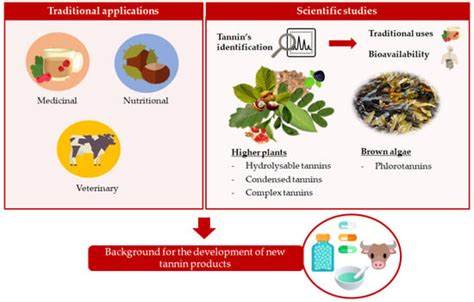Tannins are a type of naturally occurring compound found in plants, particularly in the bark, leaves, and seeds of certain species. They are known for their astringent, bitter taste and are often used in the production of wine, tea, and other beverages. However, tannins have a wide range of applications beyond the food and beverage industry.

In recent years, researchers have been exploring the potential uses of tannins in various fields, from medicine to materials science. Here are six innovative applications of tannins that highlight their versatility and potential:
Antimicrobial Properties
Tannins have been shown to exhibit antimicrobial properties, making them effective against a range of microorganisms, including bacteria, viruses, and fungi. This property has led to the development of tannin-based antimicrobial agents for use in medical and food applications.
For example, tannins have been used to create antimicrobial coatings for medical devices, such as catheters and implantable devices. These coatings can help prevent the growth of microorganisms and reduce the risk of infection.

Cancer Treatment
Research has also explored the potential of tannins as a cancer treatment. Tannins have been shown to exhibit anti-proliferative and pro-apoptotic effects, meaning they can help prevent the growth of cancer cells and induce cell death.
One study found that a specific type of tannin, called ellagic acid, was effective in inhibiting the growth of breast cancer cells. Another study found that tannins from green tea extract inhibited the growth of prostate cancer cells.

Biodegradable Materials
Tannins can be used to create biodegradable materials, such as bioplastics and composites. These materials have the potential to replace traditional plastics and reduce plastic waste.
One company has developed a biodegradable material made from tannins and other natural compounds. The material is compostable and can be used in a range of applications, from packaging to textiles.

Water Purification
Tannins can also be used to purify water. Research has shown that tannins can bind to heavy metals and other pollutants, making them effective in removing contaminants from water.
One study found that tannins from green tea extract were effective in removing lead and mercury from water. Another study found that tannins from oak bark were effective in removing arsenic from water.

Food Preservation
Tannins have been used for centuries as a natural preservative in food. They can help prevent the growth of microorganisms and extend the shelf life of food products.
One study found that tannins from grape seed extract were effective in preserving meat products. Another study found that tannins from green tea extract were effective in preserving dairy products.

Adhesives and Coatings
Tannins can also be used to create adhesives and coatings. Research has shown that tannins can bind to surfaces and create strong, durable bonds.
One company has developed a tannin-based adhesive for use in the construction industry. The adhesive is biodegradable and can be used in a range of applications, from flooring to roofing.

In conclusion, tannins have a wide range of innovative applications beyond the food and beverage industry. From antimicrobial properties to biodegradable materials, tannins have the potential to make a significant impact in various fields. As research continues to explore the properties and applications of tannins, we can expect to see new and exciting developments in the years to come.






What are tannins?
+Tannins are a type of naturally occurring compound found in plants, particularly in the bark, leaves, and seeds of certain species.
What are the potential applications of tannins?
+Tannins have a wide range of potential applications, including antimicrobial properties, cancer treatment, biodegradable materials, water purification, food preservation, and adhesives and coatings.
Are tannins safe to use?
+Tannins are generally considered safe to use, but it is always recommended to consult with a medical professional or qualified expert before using them for any purpose.
